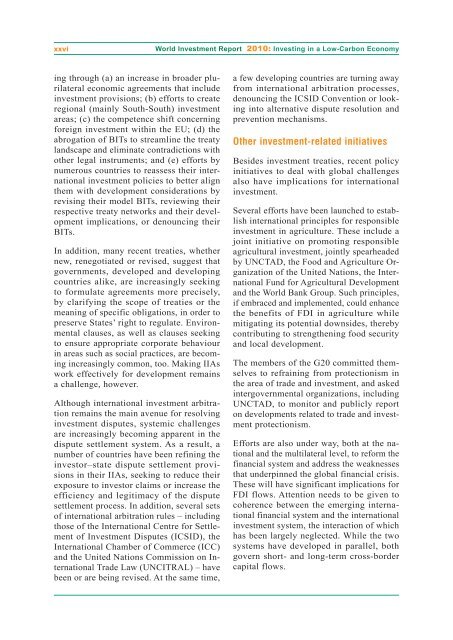UN World Investment Report 2010 - Office of Trade Negotiations
UN World Investment Report 2010 - Office of Trade Negotiations
UN World Investment Report 2010 - Office of Trade Negotiations
Create successful ePaper yourself
Turn your PDF publications into a flip-book with our unique Google optimized e-Paper software.
xxvi<br />
ing through (a) an increase in broader plurilateral<br />
economic agreements that include<br />
investment provisions; (b) efforts to create<br />
regional (mainly South-South) investment<br />
areas; (c) the competence shift concerning<br />
foreign investment within the EU; (d) the<br />
abrogation <strong>of</strong> BITs to streamline the treaty<br />
landscape and eliminate contradictions with<br />
other legal instruments; and (e) efforts by<br />
numerous countries to reassess their international<br />
investment policies to better align<br />
them with development considerations by<br />
revising their model BITs, reviewing their<br />
respective treaty networks and their development<br />
implications, or denouncing their<br />
BITs.<br />
In addition, many recent treaties, whether<br />
new, renegotiated or revised, suggest that<br />
governments, developed and developing<br />
countries alike, are increasingly seeking<br />
to formulate agreements more precisely,<br />
by clarifying the scope <strong>of</strong> treaties or the<br />
meaning <strong>of</strong> specific obligations, in order to<br />
preserve States’ right to regulate. Environmental<br />
clauses, as well as clauses seeking<br />
to ensure appropriate corporate behaviour<br />
in areas such as social practices, are becoming<br />
increasingly common, too. Making IIAs<br />
work effectively for development remains<br />
a challenge, however.<br />
Although international investment arbitration<br />
remains the main avenue for resolving<br />
investment disputes, systemic challenges<br />
are increasingly becoming apparent in the<br />
dispute settlement system. As a result, a<br />
number <strong>of</strong> countries have been refining the<br />
investor–state dispute settlement provisions<br />
in their IIAs, seeking to reduce their<br />
exposure to investor claims or increase the<br />
efficiency and legitimacy <strong>of</strong> the dispute<br />
settlement process. In addition, several sets<br />
<strong>of</strong> international arbitration rules – including<br />
those <strong>of</strong> the International Centre for Settlement<br />
<strong>of</strong> <strong>Investment</strong> Disputes (ICSID), the<br />
International Chamber <strong>of</strong> Commerce (ICC)<br />
and the United Nations Commission on International<br />
<strong>Trade</strong> Law (<strong>UN</strong>CITRAL) – have<br />
been or are being revised. At the same time,<br />
<strong>World</strong> <strong>Investment</strong> <strong>Report</strong> <strong>2010</strong>: Investing in a Low-Carbon Economy<br />
a few developing countries are turning away<br />
from international arbitration processes,<br />
denouncing the ICSID Convention or looking<br />
into alternative dispute resolution and<br />
prevention mechanisms.<br />
Other investment-related initiatives<br />
Besides investment treaties, recent policy<br />
initiatives to deal with global challenges<br />
also have implications for international<br />
investment.<br />
Several efforts have been launched to establish<br />
international principles for responsible<br />
investment in agriculture. These include a<br />
joint initiative on promoting responsible<br />
agricultural investment, jointly spearheaded<br />
by <strong>UN</strong>CTAD, the Food and Agriculture Organization<br />
<strong>of</strong> the United Nations, the International<br />
Fund for Agricultural Development<br />
and the <strong>World</strong> Bank Group. Such principles,<br />
if embraced and implemented, could enhance<br />
the benefits <strong>of</strong> FDI in agriculture while<br />
mitigating its potential downsides, thereby<br />
contributing to strengthening food security<br />
and local development.<br />
The members <strong>of</strong> the G20 committed themselves<br />
to refraining from protectionism in<br />
the area <strong>of</strong> trade and investment, and asked<br />
intergovernmental organizations, including<br />
<strong>UN</strong>CTAD, to monitor and publicly report<br />
on developments related to trade and investment<br />
protectionism.<br />
Efforts are also under way, both at the national<br />
and the multilateral level, to reform the<br />
financial system and address the weaknesses<br />
that underpinned the global financial crisis.<br />
These will have significant implications for<br />
FDI flows. Attention needs to be given to<br />
coherence between the emerging international<br />
financial system and the international<br />
investment system, the interaction <strong>of</strong> which<br />
has been largely neglected. While the two<br />
systems have developed in parallel, both<br />
govern short- and long-term cross-border<br />
capital flows.

















